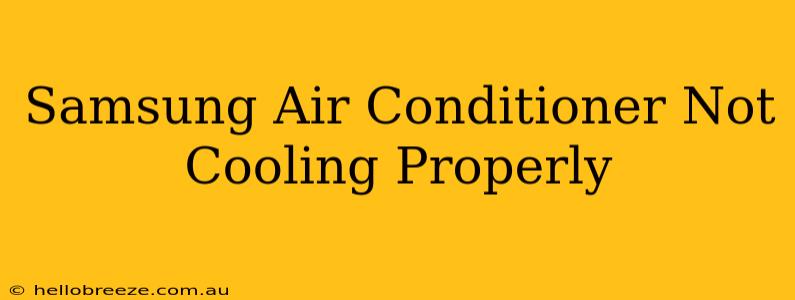Is your Samsung air conditioner failing to deliver the cool comfort you expect? A malfunctioning AC unit can be incredibly frustrating, especially during a heatwave. This guide will walk you through common reasons why your Samsung AC isn't cooling properly and offer practical troubleshooting steps to get it working again.
Diagnosing the Problem: Why Your Samsung AC Isn't Cooling
Before you call a repair technician (which might be necessary), let's try to pinpoint the issue. Several factors can contribute to poor cooling performance. Let's explore some of the most frequent culprits:
1. Dirty Air Filter: A Common Culprit
A clogged air filter is the most common reason for reduced cooling efficiency. A dirty filter restricts airflow, forcing your AC unit to work harder and potentially leading to overheating.
- Solution: Locate your air filter (usually accessible behind a panel on the unit). Remove it, gently clean it with warm soapy water (or replace it if it's severely soiled), and let it dry completely before reinstalling. Remember to check and clean your filter regularly, ideally every 2-4 weeks, depending on usage and environment.
2. Frozen Evaporator Coils: A Serious Issue
Frozen evaporator coils are a more serious problem. This indicates a potential issue with airflow, refrigerant levels, or a malfunctioning component. A frozen evaporator coil prevents proper heat exchange, hindering the cooling process.
- Solution: Do not attempt to defrost the coils yourself. This could damage your unit. Turn off your AC and contact a qualified Samsung technician for professional assistance.
3. Refrigerant Leaks: A Professional Fix
Refrigerant is the key component responsible for cooling. A leak in the refrigerant line significantly reduces cooling capacity. Identifying and repairing refrigerant leaks requires specialized tools and expertise.
- Solution: If you suspect a refrigerant leak, immediately call a qualified HVAC technician. Attempting to fix this yourself can be dangerous and may void your warranty.
4. Problems with the Condenser Unit: Outdoor Inspection
The condenser unit, located outdoors, plays a vital role in the cooling cycle. Check for obstructions like leaves, debris, or overgrown vegetation that might restrict airflow.
- Solution: Clear any debris around the condenser unit, ensuring adequate space for proper ventilation.
5. Electrical Issues: Safety First!
Problems with the electrical supply, such as a tripped breaker or faulty wiring, can prevent your AC from functioning correctly.
- Solution: Check your home's circuit breaker box to see if the breaker for your AC unit has tripped. Reset it if necessary. If the problem persists, contact a qualified electrician to rule out any electrical faults.
Preventative Maintenance: Keeping Your Samsung AC Running Smoothly
Regular maintenance is crucial for extending the lifespan of your Samsung air conditioner and ensuring optimal cooling performance. This includes:
- Regular Filter Cleaning: As mentioned above, cleaning or replacing the air filter regularly is essential.
- Annual Professional Inspection: Schedule a yearly inspection by a qualified HVAC technician to identify and address potential problems before they escalate.
- Proper Ventilation: Ensure adequate ventilation around both the indoor and outdoor units.
When to Call a Professional
If you've tried the troubleshooting steps and your Samsung AC is still not cooling properly, it's time to call a professional. Don't attempt complex repairs yourself, as you risk further damage or injury. A qualified technician can accurately diagnose the problem and provide an effective solution.
By understanding the potential causes of poor cooling and following these troubleshooting tips, you can improve your chances of restoring your Samsung air conditioner to its peak performance. Remember, regular maintenance is your best defense against unexpected breakdowns.

